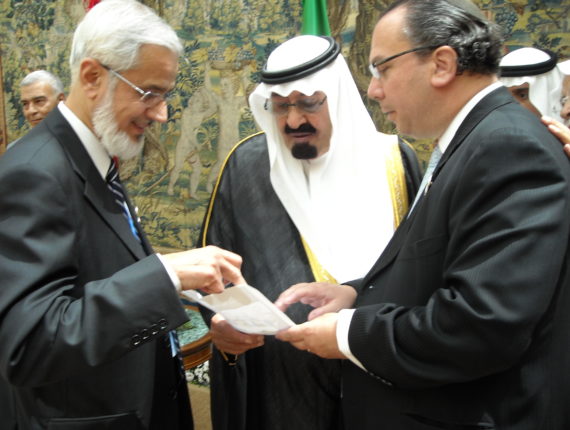
5 Towns Jewish Times
By Larry Gordon
November 01, 2018
When I used to read stories about Rabbi Marc Schneier of The Hampton Synagogue and his efforts to establish and foster improved relationships between Jews and Muslims, I could not help but wonder what he was doing, what he was up to, and why in the world would he even bother?

Dr. Muzammil H. Siddiqi, King Abdullah bin Abdulaziz Al-Saud of Saudi Arabia and Rabbi Marc Schneier.
Jews and Muslims were and are at odds. Differences that stem from the dispute that in part emanates from the creation of the state of Israel dating back to 1948 and for many years prior to that time.
Of course it is not negative for there to be some kind of line of communications or even a connection between leaders of these two major religions both here in the U.S. and indeed over there in the Middle East.
Rabbi Schneier spoke to me from Israel on Monday afternoon, just after he returned from a three week tour of the Gulf States. He reported that on this trip he believes some very significant steps have been taken between these Muslim countries with no diplomatic relations with Israel and the Jewish state.
Rabbi Schneier is an eloquent visionary who operates with cool and thoughtful professionalism and with an eye always on that which is in the best interest of the Jewish people worldwide. After his recent stay in the United Arab Emirates (UAE), Bahrain, and Azerbaijan, as well as recent meetings with Saudi and Omani officials, the rabbi says that he is hopeful there will be big advances in the diplomatic evolution between the Gulf States in the very near future.
He pointed out that not all the Gulf countries are on the same page. There are differences between these countries and Qatar, where the royal family there has close relations with Iran and is a consistent supporter of Hamas in Gaza.
“The Gulf countries definitely have differences,” Rabbi Schneier said. “But, fascinatingly, the one matter they agree upon is the need to develop a closer and beneficial link to the State of Israel.” And the rabbi points out that the motivation of the Gulf countries is only secondarily about the need for these countries to join force to counter the Iranian threat to the region.
Gulf region leaders say their interest in moving closer to Israel is the economic advantages they see for themselves and the opportunity to incorporate Israeli innovations. Schneier said that over the last several decades, the desire to work with Israel has been paralyzed by the lack of progress in talks between Israel and the Palestinians.
The rabbi said the Gulf States would still like to see progress made in the direction of establishing a Palestinian state in some still-undetermined fashion. But the most dramatic change today is that they now believe that the two efforts — peace and business — can take place simultaneously.
The 15-year-long effort by Rabbi Schneier is slowly but very assuredly seeing results. To that end, Prime Minister Benjamin Netanyahu visited the Muslim country of Oman last week in a visit with Omani leaders that was not publicized until after the prime minister returned from Oman on Friday.
You may have seen the widely circulated video of a gold medal being awarded to an Israeli judkoku in Abu Dhabi. Israeli Culture and Sport Minister Miri Regev was seen crying as “Hatikvah” was played — the first time Israel’s national anthem was played in the United Arab Emirates. Regev is making her own inroads in the Gulf States as have Israel’s Communications Minister Ayoob Kara and Prime Minister Netanyahu.
It is no coincidence that the devoutly religious leaders of these countries in the Gulf Coordinating Council (GCC) seem comfortable and willing to work with religious Jews such as Rabbi Schneier, who has a long and illustrious record working with religious faiths and leaders around the world.
The rabbi said the order of priority today for Gulf leaders is the following: G-d, Trump, and Israel. It is new and exciting thinking with a tinge of influence of the prophet Isaiah, who wrote: “And many people shall go and say, Come ye, and let us go up to the mountain of the L-rd, to the house of the G-d of Jacob; and He will teach us of His ways, and we will walk in His paths: for out of Zion shall go forth the law, and the word of the L-rd from Jerusalem. And He shall judge among the nations, and shall rebuke many people: and they shall beat their swords into plough shares, and their spears into pruning hooks: nation shall not lift up sword against nation, neither shall they learn war anymore.”
Copyright © 2025 Foundation For Ethnic Understanding. All rights reserved. | Privacy Policy